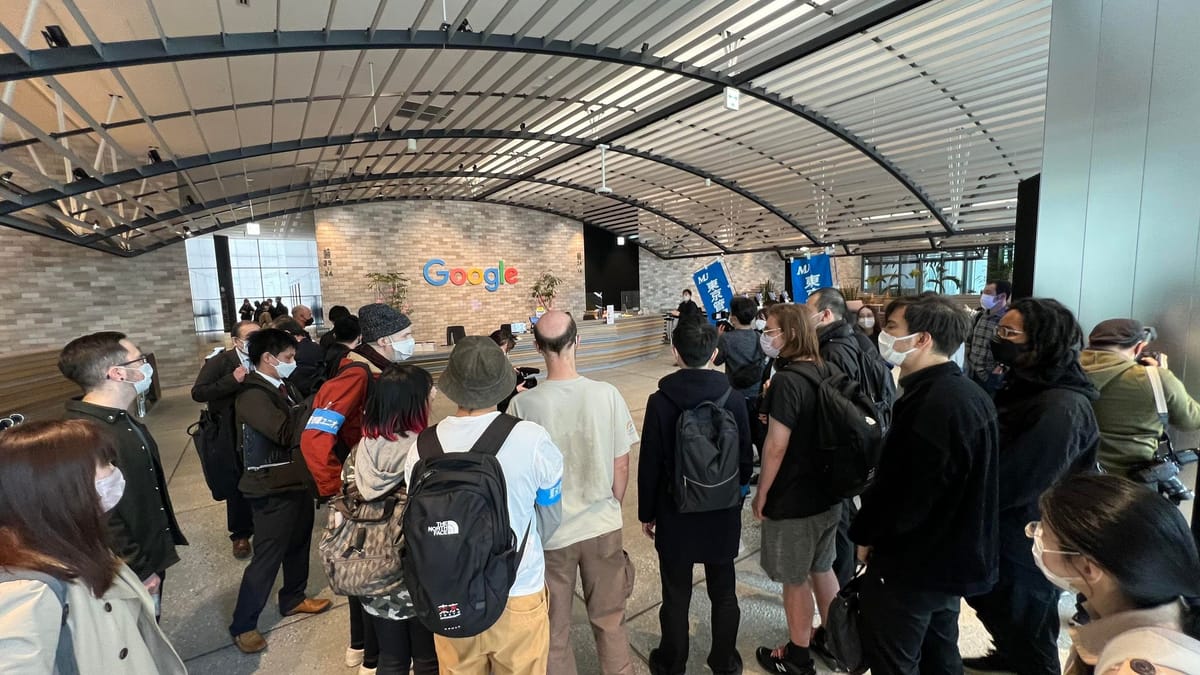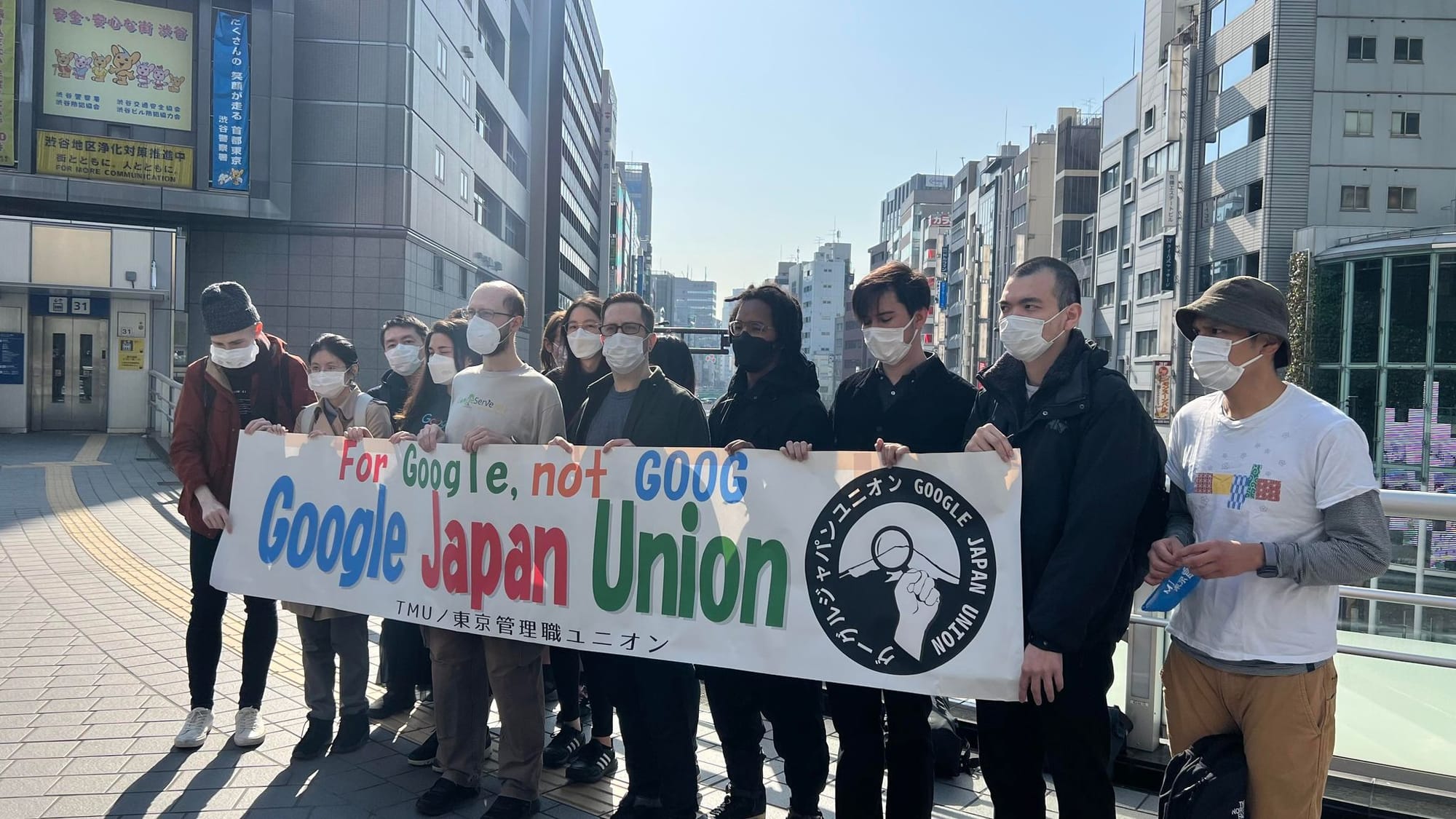Japanese labor laws protect Google employees
Workers in Japan find better legal protection than their American counterparts

Japanese companies have a global reputation for being hard on employees, so it might be a surprise to some to learn that they are protected by labor laws that leave Americans in the shade.
Take Frank (not his real name), an employee of Google Japan. The tech giant abruptly announced earlier in 2023 that it would sack 6 percent of its global employees. Frank learned this in an email from Google Japan in early March the same year. Using local labor laws, he decided to organize with his colleagues and fight back.
“I would have lost my job if I had been in Singapore or the US,” Frank said. “When you lose both access to your job and the office itself just overnight, you feel incredibly helpless. But in Japan, I can fight back. I feel blessed that I can continue resisting alongside my union members. And that feels empowering.”
Breaking Labor Laws
Google in an email thanked Frank for his years of contribution to the company and gave him two weeks to quit. He had transferred from overseas to the Shibuya Office in Tokyo less than a year prior. He assumed he had no choice but to sign Google’s ‘agreement’.
“I wasn’t sure if Google would fire people in Japan, given that they were complying with the local law,” Frank said. "I didn’t want to sign the ‘separation’ agreement. It was not an option for me.”
When Frank received a video call from Deloitte Tohmatsu Consulting LLC – not Google – asking him to confirm his resignation, he wanted to know the consequences of not complying. He was told he would be ‘harrassed’ to sign it.
That will be against the law in Japan, he pointed out.
“Yeah,” the representative confirmed.
Google Japan declined to comment on whether it outsources dismissals to Deloitte or to confirm whether the consulting firm insinuated possible harassment, according to the Japanese online outlet, Friday Digital.
Joining a Union
Some 30 Googlers fought back by forming a union in March 2023. The union has since grown to more than 70 members, in a company with more than 2,000 employees.
After the video call with the consulting firm, Frank joined the union. He learned that workers are legally protected and that foreign companies that operate in Japan must comply with the Labor Standards Law, the Occupational Health and Safety Law, and the Labor Union Law of Japan, just to name a few.
By contrast, Frank and his colleagues heard that their counterparts in the US had been locked out of their office the day after they received the email dismissing them.
Google's CEO notified the company’s US employees in an email dated January 20. The mail said that 12,000 employees would be targeted for layoffs – 6 percent of its global workforce.
Media reports said that emails arrived in the inboxes of even those who were on long-term maternity leave.
Harassment
However, in France and Germany, where it is virtually impossible to unilaterally dismiss employees without talking to worker representatives or unions, the media giant could not even send out notices of termination. “This is what should have happened with Google in Japan because we have the labor laws here.”
With more than 50 members present at the negotiation table, Google Japan Union demanded during its first negotiation that the company withdraw its “separation” notices and stop harassing union members. Forcing employees to sign the resignation agreement would constitute harassment, violating Japanese labor law, the union said.
Faced with such uncertainty about their futures, some union members were angry and emotional. Frank spoke about the harassment he endured for two weeks, with constant emails pressing him to sign the agreement. Google’s human resources manager wished him success in his job hunt, assuming he was leaving the company.
“I was stressed about this exchange, of course, but I had expected it. So there was no surprise. I told myself that I would endure it for the next two weeks. As a union member, I knew I was protected by the law."
Thanks to the union, Frank is still working at the company for the same salary, though the two-week deadline has long passed.

Fighting retaliation
Yet, the union couldn't save Frank from the company’s revenge.
Employees who refused to sign the separation agreement were transferred to posts that are not commensurate with their skill sets, for instance, troubleshooting for individual clients – a task that is ordinarily offshored.
This is not only demoralizing, but the team is also secluded from the rest of the in-house routines such as team events, employee exchanges, events planned around the visits from the upper management. They don’t even receive business updates, Frank said.
“The company is waiting for us to leave voluntarily,” he said. “I think most people would feel stressed out without knowing how long this situation will last. The company’s goal is to make us feel anxious, so we try our best to stay calm as much as possible."
According to CNN, the first letter sent to shareholders by founders Larry Page and Sergey Brin in 2004 stated that "the Googlers, as we call ourselves, are all we have," and that over time, "we will gradually increase benefits rather than reduce them."
As the company grew, the hospitality diminished, and CNN quoted a source close to Google as saying it became more bureaucratic and less like a big family.
American Imperialism
Because the company is global, its employees are also globally connected. The company cannot stop them from exchanging tips on how to build resistance to the layoffs.
Frank will never forget the surprise of his American employees when they heard his story of how he was able to keep his job in Japan while they lost theirs.
Those who are “impacted” in Japan keep their job and the same amount of salary - dispute the pressure to quit.
Frank hopes that the global layoff is a chance for Google workers across the globe, especially in the US, to learn about the power of unions and workers’ rights - and labor laws.
“Some employees say that we’re like a family at Google because it expresses concerns over their welfare and psychological health,” Frank says. “For those who identify themselves with Google, they inevitably felt like they were betrayed. They lost everything overnight. But workers should also question how they develop a sense of belonging with the company they work for and make sure it does not become their identity, as companies take advantage of this.”
“Google is a multinational company that imposes American Imperialism on workers with its labor conditions and business practices. As soon as the company decides you are no longer easily exploitable, it dumps you. But that‘s not right. It must comply with the local rule of the law.”
With persistent negotiation, the union members who faced unfair transfer like Frank were reassigned to proper posts.
Note: This story was first reported in 2023



Comments ()